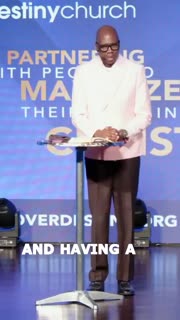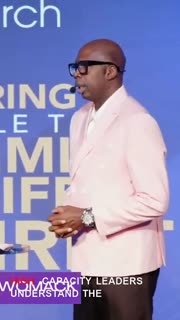Empowering Leadership: Purposeful Service in the Church
Devotional
Sermon Summary
Bible Study Guide
Sermon Clips
1. "And having a just vision what we're trying to argue and say is that God has not placed you here by chance or by mistake. God has placed you here intentionally amen and that God wants you to live life on purpose not just to live but God wants you to live life on purpose and that part of that purpose that God wants to do through your life is what God wants to do through you and the local church and what God wants to do through you and your missionary efforts amen." [44:28] (31 seconds)
2. "The people of God will have peace when leaders properly manage their pieces. Why should you be interested in this message? Because God has made you a solution. And not a problem. Too many of us don't understand that God has designed each of us to be a solution. When you read the book of Judges and it's talking about Gideon, when Gideon figured out that God didn't cause him there to be a problem, but God caused him in the midst of a problem to be a solution, it transformed his world. How many of you all know that God has called you to be a solution?" [49:03] (42 seconds)
3. "You will not have fulfillment until you fulfill the purpose, the plan, the vision that God has ordained for your life, amen? The question is not if you have a purpose, the question is not, if you have a place, the question is, where is your place? And the question is, where is your impact, amen? So God has designed you to be a difference maker." [50:50] (24 seconds)
4. "The New Testament clearly teaches us that if you're a believer in Jesus Christ, we all are ministers. And if you're a believer in Jesus Christ, we all have at least one spiritual gift to serve the body of Christ. Amen. Unfortunately, in the African-American church, we have a skewed focus of the breadth of ministry and who can be involved with ministry." [01:00:31] (30 seconds)
5. "When you lead, you're saying, basically, I've been set aside to submit, to sacrifice, and to serve the Lord's cause through where God has placed me. We're tracking together. You say, pastor, that's easy for you to say because you were trying to get out some work. Before I was in ministry as my vocation, and I had a full-time job, I had to work to stay focused on my jobs because my attention kept being drawn to ministry. And I promise you, when I got off that job, the remainder of my waking hours, for the most part, I spent doing ministry." [01:07:09] (49 seconds)
6. "If you've been in God any length of time and you don't know what God has uniquely given you to make a contribution to humanity, you've got a long-distance relationship with him. God will give you an internal burning for what you ought to be doing. Are we tracking together? When you are living for God, walking with God, praying to God, submitting to God, obeying God, God hits a moving target. God will place you where you're supposed to be." [01:10:34] (34 seconds)
7. "Leadership hierarchy is not about value but about function. We can have the same value but a different function we're tracking together c c c c o c o c i o c m o owner board member those are functions not values we all made in the image of god and because we're all made in the image of god we all bear the same value before god never let a title determine your value see some of y'all waiting until your title get changed until you show what you can do that's the problem you allow this title to validate your function you ought to know what your skills are your ability but you ought to use your skills your talents and your ability no matter what your title is." [01:19:58] (64 seconds)
8. "High-capacity leaders understand the stakes and say, my wrong way to complain, but I'm trying to serve that sister whose husband called the police on her. I'm trying to help that person whose child can't stay at home. I'm trying to help that person whose marriage is falling apart. I'm trying to help that person contemplating suicide. I'm trying to help that person who's living out their car this week. And some of us in this room right now, right now, we got to bring our A-game every week. No matter how we feel, no matter how our week was, we got to bring... My week was terrible, but I got to have my A-game ready this morning." [01:30:03] (54 seconds)
Ask a question about this sermon
2. "The people of God will have peace when leaders properly manage their pieces. Why should you be interested in this message? Because God has made you a solution. And not a problem. Too many of us don't understand that God has designed each of us to be a solution. When you read the book of Judges and it's talking about Gideon, when Gideon figured out that God didn't cause him there to be a problem, but God caused him in the midst of a problem to be a solution, it transformed his world. How many of you all know that God has called you to be a solution?" [49:03] (42 seconds)
3. "You will not have fulfillment until you fulfill the purpose, the plan, the vision that God has ordained for your life, amen? The question is not if you have a purpose, the question is not, if you have a place, the question is, where is your place? And the question is, where is your impact, amen? So God has designed you to be a difference maker." [50:50] (24 seconds)
4. "The New Testament clearly teaches us that if you're a believer in Jesus Christ, we all are ministers. And if you're a believer in Jesus Christ, we all have at least one spiritual gift to serve the body of Christ. Amen. Unfortunately, in the African-American church, we have a skewed focus of the breadth of ministry and who can be involved with ministry." [01:00:31] (30 seconds)
5. "When you lead, you're saying, basically, I've been set aside to submit, to sacrifice, and to serve the Lord's cause through where God has placed me. We're tracking together. You say, pastor, that's easy for you to say because you were trying to get out some work. Before I was in ministry as my vocation, and I had a full-time job, I had to work to stay focused on my jobs because my attention kept being drawn to ministry. And I promise you, when I got off that job, the remainder of my waking hours, for the most part, I spent doing ministry." [01:07:09] (49 seconds)
6. "If you've been in God any length of time and you don't know what God has uniquely given you to make a contribution to humanity, you've got a long-distance relationship with him. God will give you an internal burning for what you ought to be doing. Are we tracking together? When you are living for God, walking with God, praying to God, submitting to God, obeying God, God hits a moving target. God will place you where you're supposed to be." [01:10:34] (34 seconds)
7. "Leadership hierarchy is not about value but about function. We can have the same value but a different function we're tracking together c c c c o c o c i o c m o owner board member those are functions not values we all made in the image of god and because we're all made in the image of god we all bear the same value before god never let a title determine your value see some of y'all waiting until your title get changed until you show what you can do that's the problem you allow this title to validate your function you ought to know what your skills are your ability but you ought to use your skills your talents and your ability no matter what your title is." [01:19:58] (64 seconds)
8. "High-capacity leaders understand the stakes and say, my wrong way to complain, but I'm trying to serve that sister whose husband called the police on her. I'm trying to help that person whose child can't stay at home. I'm trying to help that person whose marriage is falling apart. I'm trying to help that person contemplating suicide. I'm trying to help that person who's living out their car this week. And some of us in this room right now, right now, we got to bring our A-game every week. No matter how we feel, no matter how our week was, we got to bring... My week was terrible, but I got to have my A-game ready this morning." [01:30:03] (54 seconds)








